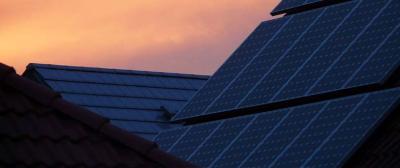Best Solar Panels in the UK 2025: Curated By Our Experts
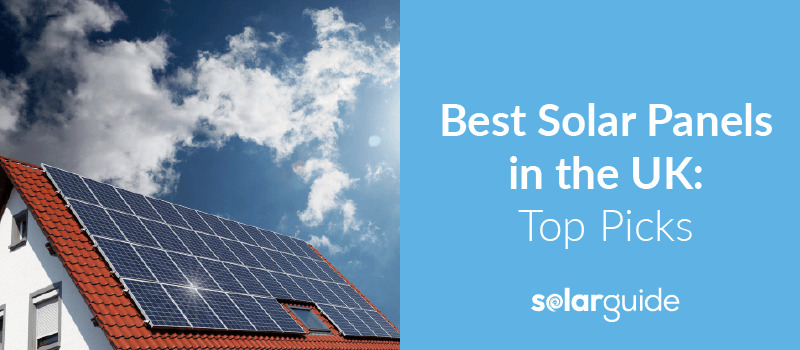
- The best solar panel in 2025 is SunPower Maxeon 6.
- The best solar panel in terms of warranty is the Project Solar Evolution Titan 445, offering a lifetime warranty of 99.9 years.
- The best solar panel for the average 3-bedroom home is the REC Alpha Pure-R.
Over the last few years, it has become increasingly popular to install solar panels for homes across the UK. If you want to join the millions of homeowners who have opted for this energy source, then you will want to know what the best solar panels on the market are.
In this guide, we walk you through the best solar panel brands available today to help you find the right fit for your home. In no particular order, the 5 best solar panels in the UK this year are:
- Best overall: SunPower Maxeon 6.
- Best in terms of warranty: Project Solar Evolution Titan 445.
- Best in terms of efficiency: REC Alpha Pure-R.
- Best in terms of power: REA Solar Fusion 2.
- Best in terms of cost: Sharp NU-AF.
If you want to have one of these solar panel models installed, the next step is to find reliable solar panel installers. Our service saves your precious time and energy, avoiding hours of tedious research.
All you have to do is fill in our 30-second form and sit back and relax while we have 4 local solar panel installers reach out to you with quotes for their services. Then, simply compare the information they provide and secure the best deal for your home. Click below to request free, non-binding quotes now!
Get your best deal
Quickly compare up to 4 free quotes
- It's free, easy and without obligation
- Compare quotes & get the best prices
- Save up to £915 per year

Best solar panel overall: SunPower Maxeon 6
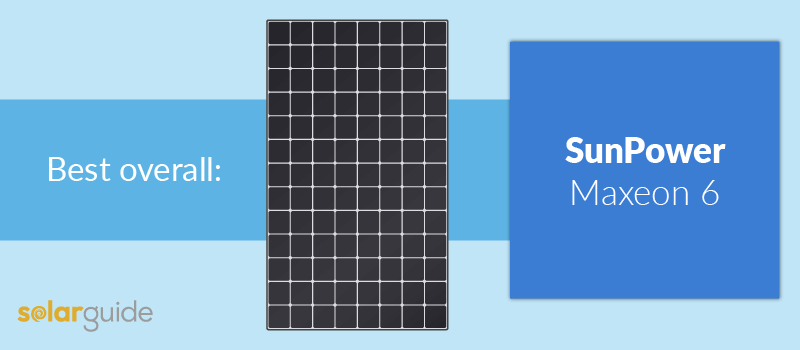
| Solar Panel Type | Price Range (4kW System) | Power Output Size | Efficiency | Warranty Period |
|---|---|---|---|---|
| Monocrystalline | £6,600 - £7,500 | 475W | Up to 22% | 25-40 years |
SunPower's Maxeon range is known for its high quality, exceptional power output, and great warranty period. In addition to these impressive features, the Maxeon 6 is also highly durable, having one of the lowest degradation rates compared to other solar panel brands (2.0% in the first year and 0.2% for each year after that). This makes the Maxeon 6 one of the best solar panels in terms of quality and durability.
Alongside outstanding solar panels, this US-based manufacturer also offers solar batteries that you can pair with your solar system to store energy for later use. Of course, such an addition will incur extra costs. o, make sure to check if a SunPower solar battery is feasible for you.
Find out more about pairing a 4kw solar system with a battery in the UK or installing a 5kW solar system with a battery in the UK.
At the same time, it's important to note that there are also some downsides to the Maxeon 6. The primary disadvantages of this solar panel model are that it's more expensive than other brands and that it's also heavier than other options, so it might not be the best solar panel for some roof types.
Best solar panel in terms of warranty: Project Solar Evolution Titan 445
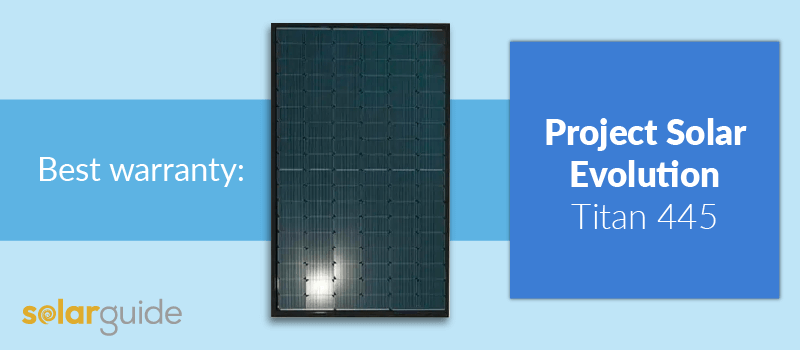
| Solar Panel Type | Price Range (4kW System) | Power Output Size | Efficiency | Warranty Period |
|---|---|---|---|---|
| Monocrystalline | £4,500 - £8,000 | 445W | Up to 21.4% | Lifetime (99.9 years) |
Project Solar is one of the best UK-based solar panel manufacturers today. Their Evolution Titan 445 solar panels are known for their high quality and impressive power output (445W).
What truly sets this model apart, making it one of the best solar panels in the UK, is its outstanding lifetime warranty. With a 99.9 year warranty, homeowners who opt for Project Solar's Evolution Titan 445 can rest assured that any damage to their solar panels will be covered for years to come.
In addition to these impressive features, the Evolution Titan 445 also has a sleek finish and produces energy efficiently year-round. However, it also comes with some disadvantages. These solar panels are more expensive than other options and they are also not as lightweight as other models, so make sure that you consult a solar panel installer to determine whether they're the right choice for your home.
Best solar panel in terms of efficiency: REC Alpha Pure-R
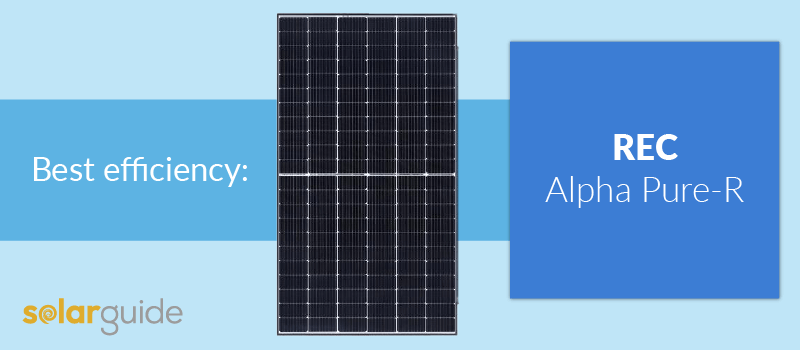
| Solar Panel Type | Price Range (4kW System) | Power Output Size | Efficiency | Warranty Period |
|---|---|---|---|---|
| Monocrystalline | £5,000 - £7,000 | 430W | 22.3% | 20-25 years |
For homeowners who prioritise solar panel efficiency, REC Group's Alpha Pure-R is an appealing option. With an outstanding 22.3% efficiency rate, these are some of the most efficient solar panels in the UK today.
These high quality solar panels also have an excellent power output (430W) and they are known for their durability. That said, some downsides of the REC Alpha Pure-R are that they are more expensive than other brands and they are also not as widely available as other models. So, be sure to weigh the pros and cons of these solar panels before having them installed.
Best solar panel in terms of power: REA Solar Fusion 2
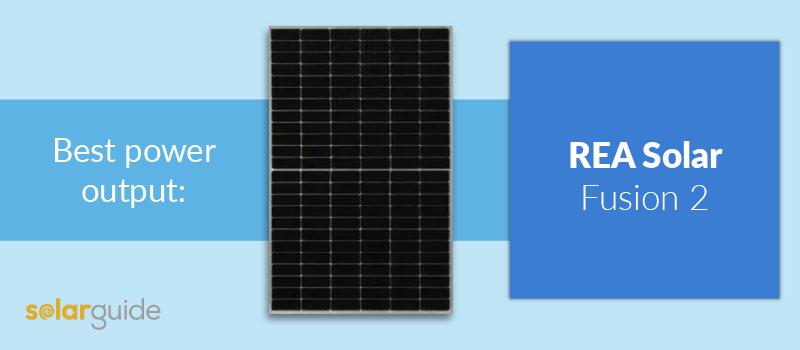
| Solar Panel Type | Price Range (4kW System) | Power Output Size | Efficiency | Warranty Period |
|---|---|---|---|---|
| Monocrystalline | £5,000 - £8,000 | 465W | 22% | 25 years |
When it comes to power output, REA Solar Fusion 2 solar panels are nearly unmatched. This is because of the innovative Fusion technology that allows these solar panels to produce more energy while not compromising on their efficiency. With a power output of up to 465W, these solar panels are an excellent option for households with high energy needs.
However, this model also has some disadvantages. The most notable ones are their high cost, as they are on the higher end of the solar panel cost in the UK, and their shorter warranty period compared to other brands.
Best solar panel in terms of cost: Sharp NU-AF
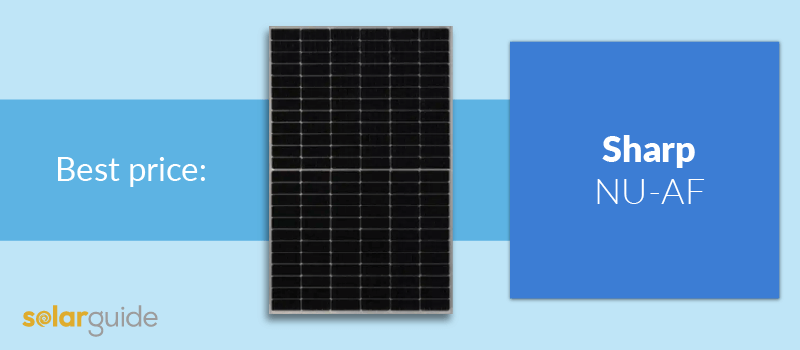
| Solar Panel Type | Price Range (4kW System) | Power Output Size | Efficiency | Warranty Period |
|---|---|---|---|---|
| Monocrystalline | £1,900-£2,500 | 370W | 19% | 10-25 years |
Sharp solar panels are renowned for their quality and durability. When it comes to their NU-AF model, they combine impressive solar technology with affordability. At about £190 per solar panel, Sharp NU-AF solar panels are some of the cheapest solar panels on the market.
While they are some of the best solar panels for a lower budget, there are also some disadvantages when it comes to Sharp NU-AF solar panels. For instance, they have a higher performance degradation rate of 0.7% per year. As a result, you might notice efficiency loss earlier than you would with other models.
At the same time, compared to other brands, the warranty period that Sharp offers for this model is quite short, meaning that if you face any issues with your solar panels, you might not be able to benefit from your warranty.
If this information about the best solar panels in the UK has left you with more questions than answers or if you are ready to have one of these models installed, then you will want to consult a solar expert. Not only can they give you advice tailored to your situation, but they can also offer you their installation services.
Instead of wasting hours of your precious free time browsing the internet in search of solar panel installers, let us help you get started in just 30 seconds. All you have to do is fill in our short form and we will have up to 4 local solar panel installers reach out to you with quotes for their services. This way, you can compare installers and prices to find the best installer for the job on your home in no time. Simply click below to request free, no-obligation quotes today.
Get your best deal
Quickly compare up to 4 free quotes
- It's free, easy and without obligation
- Compare quotes & get the best prices
- Save up to £915 per year

How did we choose the best solar panels in the UK?
When compiling our list of the best solar panels in the UK this year, we considered several factors that we compared across different brands and models. These include:
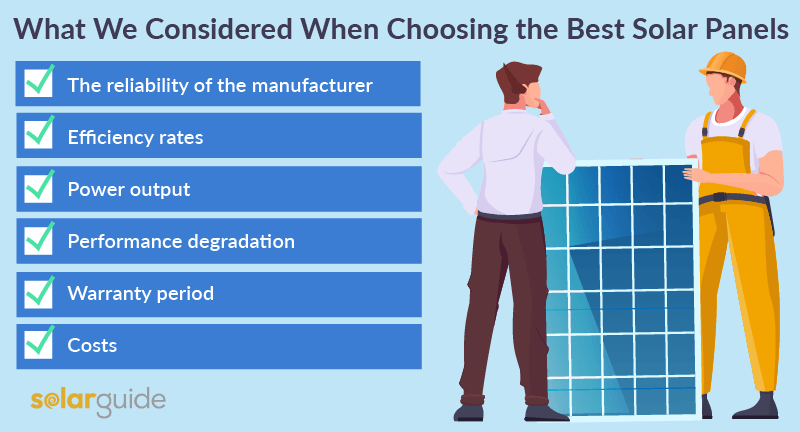
- The reliability of the manufacturer: To ensure that you are investing in high-quality solar panels, you will want to ensure that you are getting them from manufacturers with years of experience with producing reliable solar technology. All the solar panel models on our list are from solar panel manufacturers with a long history of creating high-quality products.
- Efficiency rates: Our list only includes highly-efficient solar panels. Most of them have efficiency rates of 20% or higher, which means that you will be able to enjoy efficient energy production with any of these models. Monocrystalline panels have the highest performance when compared to other commercial solar panels like polycrystalline and thin-film solar panels.
- Power output: We considered the power output of the solar panels on our list because it is an important indicator of how many solar panels you will need to satisfy your household's energy needs. By selecting solar panels with a higher power output, you can have fewer solar panels installed on your roof and still enjoy sufficient energy production. In terms of power output, monocrystalline bi-facial panels can generate the highest output for the lowest cost.
- Performance degradation: Solar panels inevitably degrade over time. However, the models in our list of best solar panels all have low degradation rates. We considered this factor because it is an indicator of how long your solar panels can continue to generate energy for your home efficiently, helping you avoid mounting energy costs. After 25 years solar panels tend to degrade between 2% to 15% depending on the model.
- Warranty period: As with any purchase you make, a warranty is an important part of investing in solar panels. To avoid any huge expenses if your solar panels suffer any damage, you will want to opt for a model that comes with a long warranty period. All the solar panels on our list come with impressive warranties, offering you the peace of mind that your solar system can be covered for years to come.
- Cost: Solar panels are far from cheap. We also factored in costs to make sure that the solar panels on our list have a good price-quality ratio. However, most of the models we have mentioned are still quite expensive. To lessen the financial burden of investing in solar energy, make sure to check whether you are eligible for any solar panel grants available in the UK.
Find the best solar panels for your UK household
Now that you know a bit more about which solar panels are the best on the market, you might be wondering: "How can I have one of these models installed?" Well, the answer is that you first need to find a solar panel installer you can trust. They can help you determine how many solar panels you need and provide a safe, high-quality installation of your new solar system.
However, finding a reliable solar panel installer on your own can be extremely difficult. After hours or even days of research and cost comparisons, you might still come up empty-handed. Fortunately, with our help, you can avoid any frustration and disappointment.
Simply fill in our 30-second form and we will put you in touch with up to 4 local solar panel installers vetted by us. They will reach out to you with quotes for their installation services, so you can easily compare installers and prices to find the right installer for you and secure the best deal for your home. All quotes are free and non-binding, so just click below to get started now!
Get your best deal
Quickly compare up to 4 free quotes
- It's free, easy and without obligation
- Compare quotes & get the best prices
- Save up to £915 per year

FAQ
- What are the best solar panels on the market in the UK?
Currently, some of the best solar panels in the UK are SunPower Maxeon 6, Project Solar Evolution Titan 445, REC Alpha Pure-R, REA Solar Fusion 2, and Sharp NU-AF. However, before choosing any of these options for your home, make sure that they can meet all your energy requirements.
- Which brand of solar panel is the best?
Today, the overall best solar panel is the SunPower Maxeon 6. What sets it apart from other models is that it has one of the lowest performance degradation rates on the market, high power output, and a long warranty. That said, there are also several other great solar panel options that you can consider, so be sure to compare them to the Maxeon 6 before making your decision.
- Which solar panel is the best and why?
SunPower Maxeon 6 is one of the best solar panel models in the UK today. With its outstanding performance and durability, as well as its impressive power output and warranty period, the Maxeon 6 is a great choice for households looking to enjoy high performance for years to come.
Find local, MSC certified Solar Installers
Start your quote
Find local, MSC certified Solar Installers













